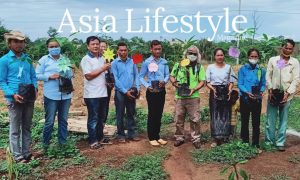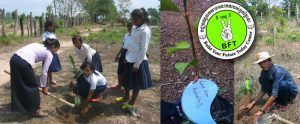I’d been living a wild expat party life on Koh Samui for many happy years and had no idea about Cambodia, her history, or the vital work of NGOs – until my islander friend and neighbour Kornelia Kuemmel declared one day that she was moving to Cambodia and “going to work with children.”
When I saw her some months later I couldn’t believe how happy she was. She’d been introduced to the Build Your Future Today Center (BFT) NGO and saw that they were doing very valuable, practical long-term work across many disciplines.
Moving Kingdoms and Changing Culture
I decided to follow her and duly moved to Siem Reap in northwestern Cambodia, volunteering to help BFT in whatever way I could. By that time (around 2011) Sedtha had worked with over 25 villages with a combined population of over 25,000 people.
I went to see the houses that had been rebuilt for a widow who had been left with 13 children after her husband had left her, and the fish-farm dug for her so she could make her own living and support her children.
Adults were being taught to read and write in their own language, mothers were being taught basic nutrition, and mother and child centres had been created to learn through play. Volunteer monks were teaching people how to live peacefully. Schools were being built, school gardens being dug, teachers’ salaries were being paid, and uniforms and books were being donated for the schoolchildren.
A lady was given a sewing-machine which she used to sew all the children’s school uniforms – on the understanding she would in turn teach other willing people.
Wells were dug, roads were laid, pig farms established, and fish farms started. And there was more. A lot more.
The Power of Empowerment
I soon understood that the key to real and impactful long-term change among this long-suffering population was the creation of true self-sustainability – using the tools of education, nutrition and health, child support centres, peace building and the improvement of people’s livelihoods.Turning
Pain into Progress
Sedtha Long had been a young man when the Khmer Rouge cast a dark shadow over his beloved country, killing most of his family. He fled the horror, eventually finding sanctuary at the refugee camps along the border just inside Thailand – and like so many people, he waited anxiously for a time when it might be safe to go home.
Once the all-clear was given to him, Sedtha (by now married and with his own children) returned to his old family home in Siem Reap, taking along a large entourage of children who had also been in those same refugee camps.
Everyone wanted to reunite the children with their mothers and fathers, but it was going to be a long and painstaking task. There were a lot of unknowns because the war had caused such extreme and brutal devastation. In addition, the local authorities had started to bring street-children to Sedtha, knowing it was a place of safety.
Greater Understanding
As Sedtha began locating their families, he realised they were so damaged from their war experiences they’d almost stopped functioning, and had turned to alcohol and drugs to survive. Violence was rife, and these villagers were unable to take care of themselves, and even less capable of coping with everyday life.
Making a Road-Map
Sedtha knew he needed to create an environment where people could feel empowered enough to take care of themselves and their families, and beginning with one village of about 1,000 people he gradually worked from one community to the next, based on a vision of them reaching self-sustainability within a four-year cycle.
Build Your Future Today Center is the name that was approved to be used for the NGO, which saw Sedtha initiating grass-roots projects to international standards. With his funds coming from Rotary Clubs, Lions Internationals, private donors and other sources, visiting friends encouraged him to become an official charity and NGO.
Starting a Food Revolution
During my time as a volunteer I met the Spanish agronomist Oscar Baixa Lavall, who wanted to spend as much time as possible helping BFT by teaching villagers how to grow school gardens, fruit and vegetables. He helped Sedtha create a farm, and over a few beers we hatched the idea of having fruit trees sponsored – creating a successful Facebook group in 2013 and starting planting fruit-tree saplings.
Real World Calling
I’d been given the opportunity to write a book about one of my previous lives, and as the contract came in to write my memoir FireWoman I returned to the UK to work on it, leaving behind this amazing country and its people – just as the sponsored tree project was (excuse the pun) starting to bear fruit.
WHO The Wake-up Call
Watching the news recently I heard the World Health Organisation remind us that food security is one of the world’s biggest and most important issues, and I had a light-bulb moment – I could restart the sponsored fruit-tree idea for families in poverty.
 I checked with Sedtha to ensure it was a project that would still work for them – we’d always worked well together, and it would be more than possible for me to work on the project remotely from the UK.
I checked with Sedtha to ensure it was a project that would still work for them – we’d always worked well together, and it would be more than possible for me to work on the project remotely from the UK.
The group is well and truly alive now, and since giving it a quick dust-off we’ve already had 39 saplings gifted in three weeks. It’s an ongoing project and it’s one that I’m proud to be part of. I volunteer my time, and all the funds are sent to BFT to support their ongoing projects.
Sponsoring a Sapling
Sponsoring a tree is very simple. Your personalised gift of a sapling such as mango or jackfruit costs $10 USD or £10 pounds. You let us know what message you’d like on the tag (a name or a dedication) and this will be hand-written onto the label and attached to the tree.
The Benefits of Growing Fruit Trees
The saplings are planted in villages in the poorest parts of Cambodia. As they grow it will enable these villagers to be more self-sufficient. It will give them precious fruit to eat and surplus to sell – as well as providing precious wood to build shelters and furniture. The branches of these trees will provide shade, and the leaves will eventually drop and put nutrients back into the soil.
As we are planting saplings we must be guided by nature, and the BFT team lets us know when the plantings take place (it may be based around the rainy season) but we’ll let you know on the group page when your tree is planted. We also create a photo album on the group page for each tree planting which identifies the personalised tags and the precise location of the tree so you can see exactly where ‘your’ tree is using a program such as Google Earth.
 Join the Facebook group to find out more – Sponsor a Fruit Tree for Families in Poverty. BFT, Cambodian NGO
Join the Facebook group to find out more – Sponsor a Fruit Tree for Families in Poverty. BFT, Cambodian NGO


